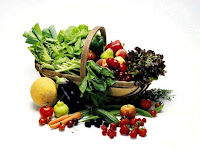
How to Wash Fruits and Vegetables
By Brittany Risher, Women's Health
Thu, Jun 23, 2011
This will make you shudder: Studies conducted at Tennessee State University found that the vegetable bin is the dirtiest part of the refrigerator. And no wonder: Fresh from the grocery store, a standard head of romaine lettuce can have as many as 2 million bacteria per gram, plus yeast, mold, and assorted germ carriers.
Swearing off fresh produce is clearly not the answer. What is? Washing it with plain, room-temperature tap water. In some cases, doing so cuts bacteria by as much as 98 percent. So stow the fancy veggie washes and sprays, and after your next trip to the store or farmers' market, ask yourself these four questions, then follow our advice.
Does it have edible skin?
Think: apples, peaches, tomatoes, zucchini, peppers
Scrub under running water for 30 to 60 seconds. "Running water helps remove most bacteria," explains Brendan Niemira, Ph.D., lead scientist with the USDA Agricultural Research Service. Scrubbing with a vegetable brush or your fingers (to avoid bruising softer fruit like peaches) will help eliminate stubborn hangers-on.
Does it have a peel?
Think: melons, oranges, and yes, even bananas
Use a vegetable brush or an unused toothbrush on the peel under running water for 30 to 60 seconds. The bristles can reach into crevices on textured skins, where dirt hides. Why bother washing it if you're not biting into it? "Microbes from the fruit's skin can spread to the flesh when you touch it with your hands or a knife," says Alfred Bushway, Ph.D., a professor of food science at the University of Maine. And even if you washed your hands, the 20 people who handled that fruit before you may not have.
Does it grow in a bunch?
Think: berries, grapes
Cut off stalks and stems where dirt can hide, dump the fruit into a colander, and hose down with your sink's spray nozzle for at least 60 seconds. (A too-brief rinse will redistribute the dirt, not remove it, according to tests conducted by Alan Johnson at Northeast Laboratories in Connecticut.) Patting the fruit dry with paper towels will further cut down on bacteria, says Sandria Godwin, Ph.D., a professor at Tennessee State University.
Is it leafy?
Think: spinach, lettuce (even prewashed mixes)
Discard the outer leaves and run the rest under cold water for 30 to 60 seconds. Dry with a salad spinner or blot with paper towels. Prewashed mixes are FDA-approved for eating straight from the container, but Godwin discovered "huge differences" in how well various brands of bagged greens were cleaned. So don't wait for a recall—take a few minutes to wash it yourself.
Comments